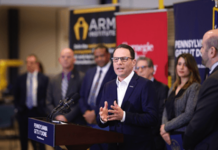Even though Congress and President Trump have reached a temporary deal to end the month-long government shutdown, the country faces lingering uncertainty about the economic implications of the extended budgetary standoff. To find out how the shutdown impacted their overall business outlook, as well as if and how their business was affected, Paychex, Inc. recently surveyed 300 business owners with 100 employees or less.
According to the survey, 19 percent of business owners said the shutdown had a negative impact on their business outlook. Despite the length of the shutdown, the future outlook for the majority (68 percent) of business owners was unaffected. Meanwhile, 13 percent reported that the shutdown had a positive impact on their business outlook.
 Paychex found that 21 percent of business owners surveyed were directly impacted by the shutdown. The remaining 79 percent were not impacted. Of those experiencing the effects, the decrease in federal worker customers had the largest impact (41 percent), followed by:
Paychex found that 21 percent of business owners surveyed were directly impacted by the shutdown. The remaining 79 percent were not impacted. Of those experiencing the effects, the decrease in federal worker customers had the largest impact (41 percent), followed by:
- Payment delay from government contractors whose services their businesses rely upon (33 percent)
- Inability to apply for a Small Business Administration (SBA) loan (29 percent)
- Awaiting approval on an SBA loan application submitted before the shutdown (24 percent)
- Suspension of data services regularly provided by the federal government (22 percent)
- Inability to access E-Verify (17 percent)
“We’re encouraged from an economic standpoint to see that the government shutdown did not impede business sentiment for many, and most of the owners we surveyed were able to conduct business as usual,” said Martin Mucci, Paychex president and CEO. “Though many businesses weren’t affected, we know that some are still facing significant challenges due to the shutdown. Our advice is to stay informed by talking to financial advisors and other trusted business partners about how to manage cash flow disruptions and preparing for a second shutdown if the temporary resolution runs out on February 15 without a permanent agreement in place.”
For Drew Boling, owner of Custom Vehicle Upfitters, which sells and installs emergency vehicle equipment to government agencies, the shutdown impacted his bottom line.
“We have clients that have received their products and services but could not pay for them during the shutdown,” said Boling. “We were also not getting any new business from affected agencies. In addition, we are in the process of buying a new building, and part of the purchase will be funded through an SBA loan. We have been told that this loan could take twice as long as normal because of the shutdown.”















![[VIDEO] Get More for Your Business in Ardmore. Oklahoma](https://businessfacilities.com/wp-content/uploads/2024/02/maxresdefault-324x160.jpg)
